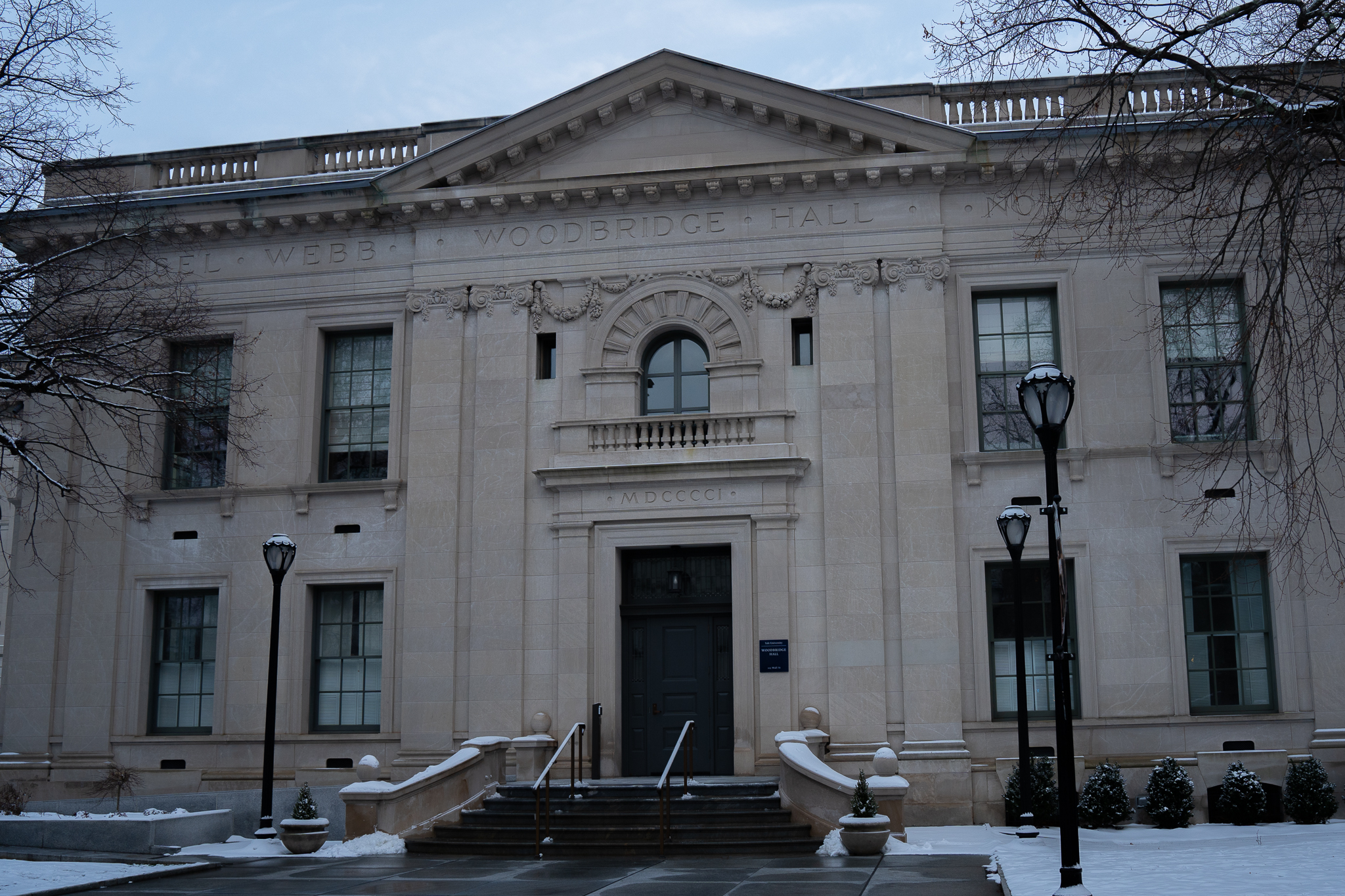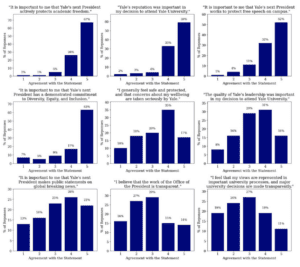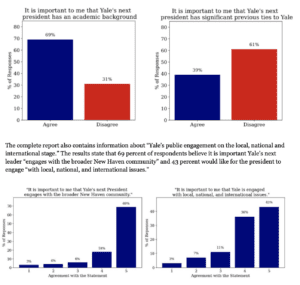Student Advisory Council members reflect on presidential search committee report
The News spoke to the three ex-officio members and secretary of the Student Advisory Council, all of whom felt that the Search Committee’s email captured their report but noted its limitations in summarizing the 21-page report.

Ellie Park, Photography Editor
Last week, the Student Advisory Council involved with Yale’s ongoing presidential search submitted a report to the search committee. After obtaining a copy of the full report — which highlights the main priorities students see for the University’s 24th president, including student mental health and free speech on campus — the News spoke with student leaders about their views.
On Jan. 29, Senior Trustee of the Yale Corporation Joshua Bekenstein ’80 sent a related email to the Yale community that summarized the report but contained apparent discrepancies.
“Josh Bekenstein’s email certainly didn’t cover all the details in the student advisory council report and in particular, it seemed to miss some of the results from the survey that reflected somewhat poorly on Yale administration,” wrote Christopher Lindsay GRD ’26, who chairs the Graduate Student Assembly. “That said, I think his email generally did a good job covering the key points from the report.”
The SAC, a novel addition to a Yale presidential search, was announced by the Search Committee following widespread student demand for a student voice in the search and was charged with collecting input from students on the qualities and characteristics they desire in University President Peter Salovey’s successor.
Notably, the announcement made on Jan. 29 was the Search Committee’s first update on the search since Oct. 23. The University did not previously respond to the News’ inquiries into the search process and vetting process at Yale that were made in light of the turmoil at peer institutions which led to the resignation of Harvard University President Claudine Gay and the University of Pennsylvania’s President Liz Magill ’88.
In his Monday announcement, Bekenstein stated that the search was a “confidential process,” which limited the information which could be shared during the search.
“Confidentiality is important to run the best search press as possible and to identify the best president for Yale,” Bekenstein said “In order to run the best search process, we have to be respectful of the privacy of the candidates in order to attract the best candidate to be president of Yale.”
What does the report say?
The SAC’s report contains survey respondent’s demographics, a series of plots displaying information collected from nine survey questions and an analysis of the free response answers submitted to survey questions. The report also lists six “personal qualities” students want the search to prioritize and a list of “university-wide challenges students find most pressing.” Among the list of concerns is student mental health, maintaining a diverse student body and addressing climate change.


Of all the findings, SAC secretary Benjamin Schaffer GRD ’27 wrote that the executive summary, pages 2 and 3 of the report, pulls out the most important findings, notably that 70 percent of respondents want an academic as Yale’s next president, but only 40 percent think the next President needs to have significant previous Yale ties.
The complete report also contains information about “Yale’s public engagement on the local, national and international stage.” The results state that 69 percent of respondents believe it is important Yale’s next leader “engages with the broader New Haven community” and 43 percent would like for the president to engage “with local, national, and international issues.”
Over half of respondents, according to the report, want Yale’s next president to be “morally ethical,” as well as “emotionally intelligent and compassionate.” Thirty-six percent want a president who is honest.
The report begins by summarizing the work that the SAC completed since its first meeting on Oct 23. The section concludes with nine bullet points underscoring data contained in the report that the SAC wanted to highlight for the Search Committee and Yale’s 24th president, who will receive the report. Among the points are the findings that 69 percent of students want a president with an academic background and that “a plurality of students” feel the administration is not transparent and that university processes do not incorporate student views.
The breadth of data included in the report begins on page 7 with a “Campus Temperature Check,” displaying a series of plots with responses to nine survey statements related to Yale’s next leader. The statements that saw the most agreement were those that stated it is important for the next president to safeguard academic freedom, protect free speech on campus and exhibit a “demonstrated commitment” to diversity, equity and inclusion.
Schaefer highlighted the significance of these concerns within the entire report, namely that the “overwhelming majority” of students in the report support academic freedom and freedom of speech.
This section continues with an analysis of the qualitative data, or free-response answers, the SAC received. The analysis states that among the recurring themes in responses were the topic of financial aid, free speech, DEI and safety. According to the report, over a third of responses addressed the ongoing Israel-Hamas war, while another third concerned free speech, academic freedom and campus responses to global news. Some students, the report notes, think Yale has done little to ensure a diversity of viewpoints on campus and that the administration was not transparent in its decision-making, or about the role of the president and donor influence.
The quantitative data evaluating students’ experiences Yale’s courses and curriculum, social life and research experiences as the top three “most positive aspects” of the student experience. Cost of living, healthcare and mental healthcare and academic advising and support constitute the “least satisfying aspects.” The SAC’s analysis of free responses to a student’s Yale experience denotes residential college life and cultural centers as among the “commonly cited” positive aspects while citing “censorship” and Yale’s “overly large and bureaucratic administration” as negative aspects.
On page 13, the SAC stressed the value of a student advisory council for future presidential searches. The section also outlines two areas of improvement: “time and institutional support.” The SAC explains that the formal announcement and election process of the SAC delayed student efforts f0r student participation in the search process. The SAC, which the report states began its work one-and-a-half months into the search because of the delay, limited the SAC’s “bold vision” to host targeted listening sessions with various student affinity groups and student organizations across the University. In turn, the SAC focused its efforts on an online survey and listening sessions, which encountered “some success” with undergraduates and not much engagement for graduate and professional students. Additionally, the report laments the “extremely limited contact” with members of the Search Committee and the lack of direction about concerns the Committee wanted the SAC to focus on addressing.
The SAC report concludes with an abridged list from 585 responses submitted as potential questions that the Search Committee could ask candidates. The questions are broken down into 20 sub-topics ranging from mental health, the Yale and New Haven relationship and diversity, equity and inclusion.
Discrepancy between report and Bekenstein’s summary
Bekenstein released a list of seven “consistent themes” the search committee had gathered from the report and its other outreach efforts, including the listening sessions it held in September, but stopped short of publishing the report in its entirety. While the three ex-officio members and secretary of the SAC generally felt that Bekenstein’s email fairly represented the contents of their report, they also noted the email announcement’s limitations in capturing the 21-page document. Julian Suh-Toma, Yale College Council President and ex-officio member of the search committee told the News that the three ex-officio members, who represent undergraduate and graduate student body leaders, planned to release the full report at the conclusion of the process.
The email from Bekenstein states that 1,200 students responded to the survey. However, the report that the SAC submitted claims to have incorporated data from over 1,800 students who responded to the survey. In a preliminary report that the SAC delivered to the search committee on Nov. 20 and presented to the committee on Dec. 8, the SAC included data from 1,200 students. It remains unclear why Bekenstein identifies this figure as the number of responses received in its preliminary report submitted to the Search Committee on Nov. 20 and presented to the group on Dec. 8. Bekentstein’s Monday update states that the information is from the report submitted to the Corporation the week prior to the announcement on Jan. 29.
The University did not respond to the News’ multiple requests for comment.
Schaffer told the News that the discrepancy in number of responses likely “a copy-editing mistake,” and said that the quantitative data between the preliminary and final reports did not change much. Suh-Toma ’25 also attributed the discrepancy to a copy-editing mistake.
Schaffer also said that he thought Bekenstein’s announcement adequately captured student input gathered by the SAC and emphasized the historic nature of both the SAC and the report which received input from more than one-tenth of the Yale student population.
Lindsay wrote to the News that he thought Bekenstein’s email was “good” but that he understood if some students feel his message “overly abridged their feedback.”
“I think it is important for people (especially myself) to understand that in his update, Josh Bekenstein had the near-impossible task of synthesizing all the feedback from us on the student advisory council in addition to all the feedback from the other groups,” Lindsay wrote.
Graduate and Professional Student Senate president Chrishan Fernando GRD ’25 wrote to the News that the Search Committee’s update “certainly didn’t cover all the details” in the SAC report.
Among the key points included in the SAC report which the student group directs the Search Committee towards is that the students feel the Yale administration is not transparent and does not incorporate student views.
“I think his email generally did a good job covering the key points from the report,” Fernando wrote. “I’m glad the presidential search committee seems to be taking student feedback seriously.”
In Yale’s last presidential search, despite the lack of a SAC, the search committee made a similar announcement with information from a report by the Yale College Council which detailed undergraduate student opinion on the search committee, which is available online.







